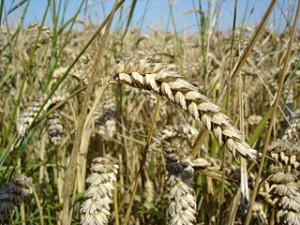Initial results from a selective breeding program at the National Institute of Agricultural Botany based in Cambridge in the UK, indicate the successful creation of a new super wheat. Scientists combined a more primitive plant with a modern wheat variety to create a new strain. Early plantings are yielding productivity increases of 30% over traditional wheat varieties. The scientists plan five years of testing before introducing the new strain to farmers.
The technique of synthesizing the new wheat variety involves cross pollinating durum pasta wheat with the seed embryo of wild goat-grass, a primitive wheat ancestor. The resulting hybrid plants yield seeds which are then further used in cross breeding with other wheat varieties. No genes were inserted into the plant genome. With wheat representing 20% of global caloric intake any improvement in yields for our planet’s growing human population is welcome. And it is good to know that selective breeding is still an option in the present day. After all that’s how we started the Agricultural Revolution 10,000 years ago.
Dr. Tina Barsby, CEO of the National Institute states in a press release dated May 13, 2013, “The original ancient cross has, so far, provided the genetic basis for all today’s modern wheat varieties. Over the years, domestication of the wheat plant has increased yields, but recently those increases have slowed leading to concerns for future food security. This is partly because domestication has eroded wheat diversity and the possibilities for improvement from within the current wheat germplasm pool are reaching their limit.
“NIAB’s Synthetic Hexaploid Wheat breeding programme re-captures some of that variation from those ancient wild relatives lost during the domestication of wheat as agriculture evolved. Fully crossable with modern wheat these synthetic wheats are an excellent bridge for transferring novel sources of genetic diversity from wild relatives into varieties already grown by farmers across the UK.”










I find it disconcerting that such massive whole genome manipulation of organisms is considered trivial when modifying an organism with a single gene seems to provoke a hysterical response. The book “Wheat Belly” describes the issues with our consumption of modern genome engineered wheat an makes many salient points.
At the very least we should take a close look at the health impact of eating these grains and determine their contribution to our modern pandemic of obesity and metabolic disease.
Hi Duane, There is no doubt that wheat as a carbohydrate (rice as well) as principal staples in much of the world’s diet, contribute to obesity. GM foods are closely studied throughout their development and it takes years for them to become commercially available. And the same rules apply for the procedure of cross breeding wheat and other crops using embryonic seeding. Is there a correlation between heightened metabolic diseases and the use of transgenic crops? Nothing in the scientific literature to date. And the only study that linked GM foods to tumors in mice was badly botched by those who conducted it, to the point that its validity has been seriously questioned by even the anti-GM scientists.